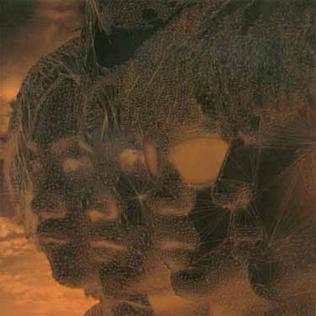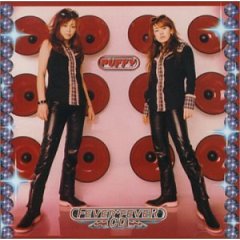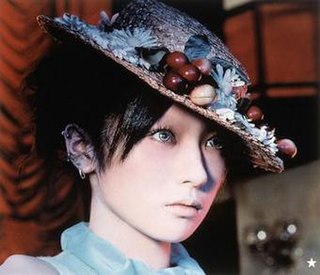
Tokyo Ska Paradise Orchestra, commonly abbreviated by fans as Skapara or TSPO, is a Japanese ska and jazz band formed in 1988 by the percussionist Asa-Chang, and initially composed of over 10 veterans of Tokyo's underground scene. At the time, the band's sound was unlike that of any of its contemporaries in the then fledgling Japanese ska scene, and over the course of the past 31 years, they have been influential on Japanese music as a whole. Its sound, the product of the musical influences of its members, is a mix of traditional ska, jazz, and rock. In the vein of many other more traditional ska acts, many of Skapara's songs are purely instrumental.

L'Arc-en-Ciel, stylized as L'Arc〜en〜Ciel and abbreviated as Laruku, is a Japanese rock band formed in Osaka in 1991 by bassist Tetsuya and vocalist Hyde. Following the departure of original members Hiro and Pero, guitarist Ken and drummer Sakura were recruited to replace them in 1992 and 1993, respectively. While they first got their start as a visual kei band, L'Arc-en-Ciel have not had any association with the movement since their major label debut in 1994. Sakura left the band in 1997 and was replaced by Yukihiro in January 1998, completing the current line-up.

Dune is the debut album by Japanese rock band L'Arc-en-Ciel. It was released by the independent label Danger Crue Records, first in a limited edition on April 10, 1993, and followed by a regular edition on April 27, which contained an additional tenth track. The regular edition reached number 1 on the Oricon indies chart on May 10.

Tierra is the second studio album by L'Arc-en-Ciel, released on July 14, 1994.

Heavenly is the third album by L'Arc-en-Ciel, released on September 1, 1995.

Heart is the fifth album by L'Arc-en-Ciel, released on February 25, 1998. It is the band's first album with yukihiro on drums and marked the band's return to mainstream attention following the arrest of the former drummer sakura. It reached number one on the Oricon chart and sold over a million copies, being certified by the RIAJ.

Ark is the sixth album by L'Arc-en-Ciel, released on July 1, 1999, simultaneously with Ray. It reached number one on the Oricon chart and sold over two million copies, being certified by the RIAJ.

Ray is the seventh album by L'Arc-en-Ciel, released on July 1, 1999, simultaneously with Ark. It reached number two on the Oricon chart, behind only Ark, and sold over two million copies, being certified by the RIAJ.

Real is the eighth album by L'Arc-en-Ciel, released on August 30, 2000. It was the band's last original studio album before a prolonged hiatus. It reached number one on the Oricon chart and sold over a million copies, being certified by the RIAJ.

Clicked Singles Best 13 is a compilation album released by L'Arc-en-Ciel on March 14, 2001. As the title suggests, it collects previously released singles, with the addition of a new track, "Anemone". There are several alternative editions to the one released in Japan, which have either differently ordered or additional tracks. Reached the top of Oricon Albums Chart.

Fever Fever is a 1999 album by PUFFY.

The Best of L'Arc-en-Ciel 1994–1998 is a compilation album released by L'Arc-en-Ciel on March 19, 2003, simultaneously with The Best of L'Arc-en-Ciel 1998–2000 and The Best of L'Arc-en-Ciel C/W. It reached number six on the Oricon Albums Chart and charted for 13 weeks.

The Best of L'Arc-en-Ciel C/W is a compilation album released by L'Arc-en-Ciel on March 19, 2003, simultaneously with The Best of L'Arc-en-Ciel 1994–1998 and The Best of L'Arc-en-Ciel 1998–2000. It collects previously released B-sides. The album reached number eight on the Oricon Albums Chart and charted for nine weeks.

Uta de Shika Ienai (歌でしか言えない) is the 19th studio album by Japanese singer-songwriter Miyuki Nakajima, released in October 1991.

Kiss is the eleventh album by L'Arc-en-Ciel, released on November 21, 2007. Its first-press edition had a 23-page photobook and sold out in less than a week. The album reached No. 1 on the Oricon album chart. The song Daybreak's Bell was used as the first opening song for the Gundam 00 series.

"Mayonaka wa Junketsu" is Japanese singer Ringo Sheena's 6th single and it was released on March 27, 2001 by Toshiba EMI / Virgin Music.

Mind Travel is the third studio album by Japanese pop-rock band Superfly, the first studio album from the group fronted by Shiho Ochi in nearly two years. The record features guest musicians from Beat Crusaders, Losalios, and Mo'Some Tonebender, and the limited edition version of the album includes a DVD with 10 music videos from songs on the album. The album will be supported by Superfly's "Mind Traveler" national tour.

Butterfly is the twelfth album by the Japanese rock band L'Arc-en-Ciel. It was released on February 8, 2012, in two versions: regular and deluxe edition, with the latter including the tracks of the first album by their alter ego band P'unk-en-Ciel, titled P'unk Is Not Dead, and a DVD. The album was released in several European countries, starting on March 5, 2012, with the United Kingdom and finishing on March 17 with Spain and Poland.

Hijitsuryokuha Sengen is the fourth studio album by Japanese singer-songwriter Chisato Moritaka, released on July 25, 1989 by Warner Pioneer. It features two versions of Moritaka's cover of the 1971 Saori Minami song "17-sai". The album is themed around Moritaka's awareness of being an idol, with songs addressing her flaws, failed romances, and interactions with her fans.

Peachberry is the 11th studio album by Japanese singer/songwriter Chisato Moritaka, released on July 16, 1997, by One Up Music. The album marked the 10th anniversary of Moritaka's music career. A limited edition release was packaged in a cardboard box and included 13 photographs; each with lyrics to a corresponding song.




















